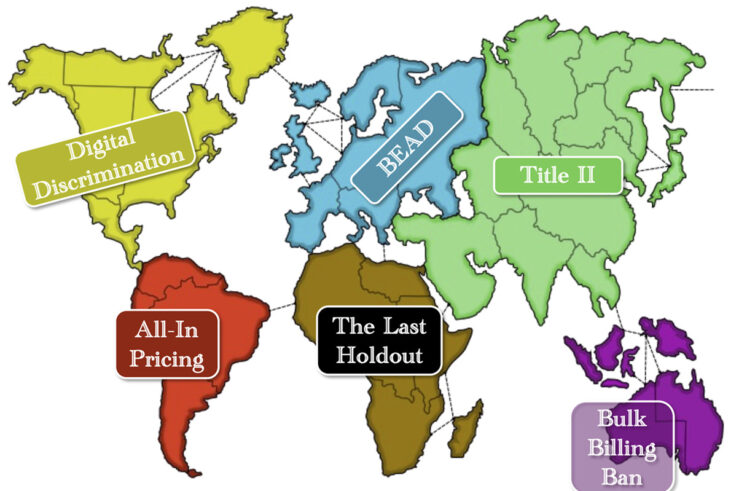This article is a part of the Section 2 Symposium symposium.
Much ink has been spilled concerning the policy split revealed by the Justice Department’s September 2008 Report on Single Firm Conduct (“SFC”) and the Federal Trade Commission’s swift and rather critical rejoinder (issued by three of the four FTC Commissioners). (By “SFC” I refer to actions taken by a “dominant” firm or by an actual or aspiring monopolist.) Among the concerns raised is that the lack of U.S. interagency consensus on SFC enforcement standards may undermine the ability of the United States to influence the development of international norms in this area, and, in particular, to promote convergence toward desirable best practices. These concerns, while understandable, are greatly overblown, in my opinion. As I will explain, work on SFC by leading scholars and agencies world-wide has greatly enhanced understanding of SFC practices in recent years. The September 2008 FTC-DOJ contretemps is a mere “bump in the road” and will not seriously detract from enforcers’ efforts to promote convergence in the SFC area. (However, the pace and direction of convergence efforts, and the desirability of particular SFC enforcements standards, are questions beyond the scope of this blog entry.)
A bit of context is appropriate. The Justice Department’s September 2008 SFC Report and the FTC’s response followed a series of Hearings on SFC jointly held by the two agencies. Those Hearings, held in 2006 and 2007, yielded a detailed record and many thoughtful contributions by leading scholars and practitioners having a range of perspectives. The Hearings were in tune with the international competition policy zeitgeist: major competition policy agencies have been seriously studying SFC issues for a number of years.
The European Commission, following years of study, released a discussion draft on SFC in late 2005, which spawned substantial commentary by lawyers, economists, and competition agency officials from major jurisdictions – including the United States. Informed by that commentary, the EU undertook additional analysis and study and issued a Guidance Paper on Article 82 in December 2008.
The Canadian Competition Bureau published Enforcement Guidelines on the Abuse of Dominance in 2001, and released draft Updated Guidelines in January 2009. The draft Updates are currently open for comment.
The International Competition Network (“ICN”) (a forum of competition agencies and non-government advisors established in 2001 to promote greater international antitrust cooperation) formed an SFC Working Group in 2006. The ICN already has produced various reports on the objectives of unilateral conduct laws, the assessment of dominance, state-created monopolies, and agency practices regarding predatory pricing and exclusive dealing/single branding. In addition, ICN reports regarding agencies’ treatment of tying/bundled discounting and single product loyalty discounts will be released this June. The ICN’s SFC work up to this time, however, has been largely descriptive in nature rather than normative. No recommendations on “best enforcement practices” in the SFC area have been made.
In short, public dialogues on SFC enforcement policy involving competition agencies are widespread, and U.S. Government involvement in such dialogues, far from being surprising, should be expected.
With the installation of new policy officials at both the Antitrust Division and the FTC, there is good reason to believe that efforts will be made to harmonize the two U.S. agencies’ approach to SFC. Furthermore, obstacles to achievement of an interagency meeting of the minds should not be exaggerated.
- First, new policy officials at the FTC and Justice Department may be expected to share very similar policy perspectives and a desire to get things done.
- Second, the differences between the two agencies, as revealed in the FTC’s rejoinder, centered primarily on such issues as the importance of avoiding false positives and the extent to which tests and safe harbors proposed by the Justice Department represented consensus (or at least broad-based) thinking. Differences of this sort can be reconciled by senior policy officials sharing similar enforcement philosophies.
- Third, there was no suggestion that the agencies disagreed about the centrality of consumer welfare and promotion of a vigorous competitive process (or the centrality of economic analysis) in the SFC policy calculus.
- Fourth, there was no effort by the Justice Department Report to advocate use of a “one size fits all” test. (Standards such as “no economic sense” or “profit sacrifice,” which had been highly touted by some commentators a few years ago, are no longer advocated as universal tests by either agency.)
- Fifth, the use of some sort of “balancing test” as a default for situations not covered by a specific standard (such as the Brooke Group rule for simple single product predatory pricing) is not ruled out by the language of the Justice Department Report or the FTC’s rejoinder. The treatment of “disproportionate balancing,” advocated by the Report but critiqued by the rejoinder, presumably could be dealt with readily.
- Sixth, Justice Department and FTC career staff worked together closely and cooperatively over several years in planning SFC Hearings and in drafting proposed report language. Informed by the expertise they have developed in the area, career staff can be counted on to implement swiftly and effectively whatever new SFC-related guidance they may be given by new political appointees. (In addition to the SFC Hearings record, Justice Department Report, and FTC rejoinder, there are excellent FTC staff papers on various SFC issues (prepared following the SFC Hearings) posted here).
This is not to suggest a panglossian view of the tasks that confront the U.S. enforcement agencies as they deal with SFC policy writ large. Nevertheless, given the widely perceived importance of clarifying official views in this area, in order to promote effective U.S. Government participation in international fora and reduce uncertainty, I am optimistic about the prospects for harmonization of U.S. agency positions in the SFC domain. It remains to be determined, of course, whether this harmonization will be reflected in a new SFC report, short agency statements, speeches by new senior appointees, or some other means.




